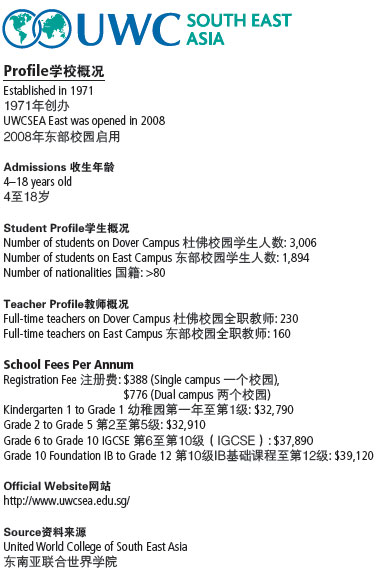 If there is one thing that distinguishes students from the United World College of South East Asia (UWCSEA) it is that they have the confidence that they are able to change the world for the better.
If there is one thing that distinguishes students from the United World College of South East Asia (UWCSEA) it is that they have the confidence that they are able to change the world for the better.
While the College prides itself on the students’ strong results — the average International Baccalaureate (IB) Diploma score in 2012 was 35.83 out of a possible 45 points — it also advocates learning outside of the classroom.
“The College has a wider project than just a straight academic programme,” said Mr Frazer Cairns, Head of Campus at UWCSEA Dover. “The fundamental purpose of the College is that students go on and bring about great change, and that is attractive to many people; it certainly chimes with me as a parent.”
Focus on Service
Indeed, bringing about change for the greater good is a big part of the College’s focus. As the biggest college out of the 12 UWCs worldwide, UWCSEA, with 4,900 students, can certainly do this on a large scale. Of this number around 3,000 study on the original Dover Campus whilst the other 2,000 are enrolled on the new East Campus in Tampines.
The UWCSEA learning programme is made up of five interlinking elements that provide a life-defining education for students: academics, activities, outdoor education, personal and social education, and service.
On the importance of service, Mr Cairns explained, “We do not allocate the same amount of time to each element, but things like service and outdoor education are fundamental parts of the education here, rather than a nice extra. That is a unique part of the College, and it is very exciting.
“Service is not just something you do, it is a mindset. It is central and fundamental for us, especially with regard to what students learn in their activity. The College finds its expression and purpose in the concept of service, and it runs through everything we do.”
Service takes three forms: to the College, to the community and to the globe. In college service, older students will take on leadership roles and provide peer support for the younger ones.
Community service sees students fan out into their local community — to nursery schools, hospitals and hospices where they interact with a wider group of people. This can be challenging, particularly when the students meet people close to death, but Mr Cairns believes such local connections are important.
Global service is when students venture beyond Singapore.
Learning Beyond Borders
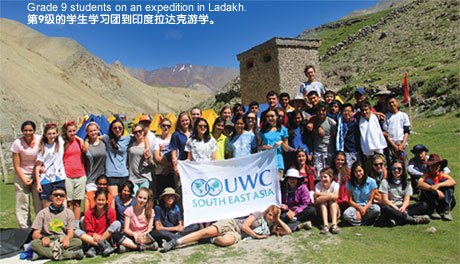 Outdoor education encompasses expeditions, which students embark on annually, starting small in Grade 1 (i.e. seven years of age) with an overnight stay in their classroom and going on to travel to countries such as Malaysia and Thailand from Grade 3 and even further afield from Grade 9. Outdoor education encompasses expeditions, which students embark on annually, starting small in Grade 1 (i.e. seven years of age) with an overnight stay in their classroom and going on to travel to countries such as Malaysia and Thailand from Grade 3 and even further afield from Grade 9.
These overseas experiences culminate in Project Week when they are in Grade 11 and 17 years old. For this, students independently, in groups of four or five, decide on a low-cost travel project, usually to somewhere in Southeast Asia. The aim is to give them the opportunity to learn independence and responsibility whilst gaining exposure to life beyond the comfortable confines of Singapore.
In 2012, 328 students travelled to 15 countries in 78 groups and worked with nearly 60 organisations, reaching out to, amongst others, street kids, leprosy sufferers and the elderly. This year, for instance, a group of students is planning on going to Bhutan to teach English at a school there.
“What the College does, first of all, is to trust them as sensible people, but at the same time we make sure it is as safe as it could possibly be. We get representatives from organisations to ensure that they understand what the reasonable expectation is, and we make sure they are trained in first aid, that they are insured and have evacuation support. We have a relationship with the International SOS, so that if something goes wrong they have medical coverage 24 hours a day and if necessary, we can fly them out,” Mr Cairns said.
Many students have found that Project Week was the crucial point at which they learned to be an individual and to stand on their own two feet. “It’s probably the first time in their lives when they make real decisions that are actually going to affect them, because most of the decisions that young people make are quite enclosed,” said Mr Cairns. “But we trust them to make sense of their decisions, and to actually understand when something doesn’t go right.”
Following Project Week, the next big step many of them take is after they graduate at the end of Grade 12, and before they go on to university. The Gap Year Volunteer Programme sees students embark on nearly year-long projects or attachments that are inspired by any one of the trips and expeditions they have been on since they were eight.
An example is the turtle sanctuary on the Malaysian island of Tioman. Having visited it in Grade 6, made it part of their studies and even raised money for it, some students keep up their interest in the project throughout their time at UWCSEA. It is therefore quite possible that they will choose to go back there for eight months or so as a volunteer in their gap year.
Other students come up with their own initiatives. “In such cases, we provide logistical support. We have a certain amount of risk assessment and on-going monitoring. If a project is successful, we will retain a link with that organisation, and probably other students can go in the following years. We want our service projects to have an extended life, and if we go in one year and leave the next, we would have changed nothing. If we can have a flow of students for 10, 15 or 20 years, then we can help to bring about substantial change,” Mr Cairns added.
A Diverse Student Body
A global outlook is almost a necessity, given UWCSEA’s diverse student population.
“We want a range of nationalities, and if someone comes from a minority nationality, which is a nationality represented by less than three per cent of our student population, it becomes interesting for us, even if it doesn’t automatically mean the student is accepted.
“One of the things we would like to do is to have children from two sides of a conflict, so they can talk about it from their own perspectives and we can all learn, because sometimes people don’t get along and we have to understand why that is the case,” Mr Cairns said.
UWCSEA also has 83 scholars within its student population. Most scholars are there for a two-year scholarship on the IB Diploma Programme for Grades 11 and 12 offered by the UWC movement, while a small number are on a three- or five-year scholarship.
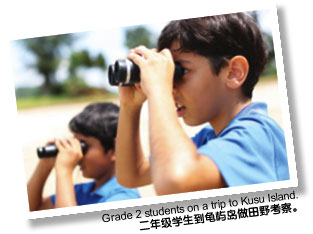 The funding for these scholarships comes from setting aside a small percentage of the annual tuition fees of the whole student body and from money raised by the UWCSEA Foundation itself. The College gives students $130,000 for a full two-year scholarship, which is inclusive of tuition fees, an allowance, air fares and funds for expeditions. The funding for these scholarships comes from setting aside a small percentage of the annual tuition fees of the whole student body and from money raised by the UWCSEA Foundation itself. The College gives students $130,000 for a full two-year scholarship, which is inclusive of tuition fees, an allowance, air fares and funds for expeditions.
The task of sourcing for these scholars falls to the various National Committees of the UWC movement. They look for young people who, regardless of their socio-economic background, possess great potential, and contrary to what might be thought this does not mean that they need to be academically brilliant. Of equal importance is “someone who has a special spark with a capacity to bring about change.”
Scholars at UWCSEA come from all over the world. “They are interesting young people and they are fascinating to talk to. We have Danish, Norwegian, Kenyan and Namibian scholars; we have young people who have lived enormously different lives from the lives our children have.
“We have a student from Timor-Leste who had to hide in the jungle from the invading army, and we have Cambodian scholars who prior to coming here were sorting through rubbish on a rubbish heap as a way of making a living. Bringing them here makes their lives better, but the benefit is to the wider community. When the rest of us are complacently saying that everyone should have Internet access, one of the scholars will say that it would be nice if everyone could have water or somewhere to live or be safe,” Mr Cairns said.
Round Square
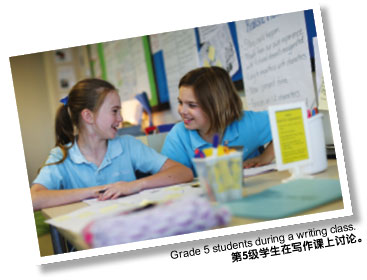 The College’s commitment to a broader life education beyond the academic earned it international approval when it was invited to be a member of Round Square, a worldwide association of over a hundred schools which share a commitment beyond academic excellence to personal development and responsibility. UWCSEA Dover was the first UWC in the world to join Round Square. The College’s commitment to a broader life education beyond the academic earned it international approval when it was invited to be a member of Round Square, a worldwide association of over a hundred schools which share a commitment beyond academic excellence to personal development and responsibility. UWCSEA Dover was the first UWC in the world to join Round Square.
“Round Square was started by the man who founded the UWC movement, Kurt Hahn. It has the same basic idea that students should get a rounded education with an outdoor element and challenge. The major benefit for us in having membership is that we get the opportunity to be part of and engage with a wider community of schools with similar values,” said Mr Cairns.
Another benefit for UWCSEA is the exchange programmes they can take part in with other Round Square schools. “A little while ago I went to South Africa with some middle school students, and it was a fantastic experience for them, because those were very different students with very different backgrounds. Being a member of Round Square provides a whole range of benefits, and I guess it provides a statement of what we think is important — a holistic education.
“We also do the National Youth Achievement Award (NYAA), which again was started by the same man. If you look at UWC, Round Square and the NYAA they’re pretty similar. All of them are ways to put forward the same message, which is that it’s important to be holistic and to think of people in a wider sense.”
The NYAA programme encourages young people between the ages of 14 and 25 to develop qualities of self-reliance and perseverance, and to forge a sense of responsibility to themselves, society and their nation. To receive an award, participants have to complete a set of required activities, and are judged on their personal achievement relative to their original circumstances and potential capabilities.
Empowering Students to Initiate Change
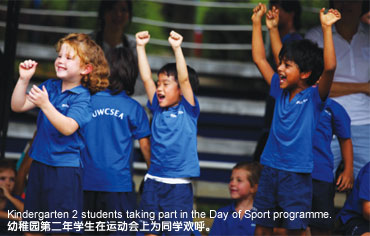 Nurturing students who can think of people in a wider sense and create change means that the College has to lead by example. The college culture is such that the students are significantly empowered and UWCSEA views them as adults of a similar standing with teachers and staff. Consequently, they have enormous amounts of influence in the College, and are entrusted with every sort of task, both big and small. Nurturing students who can think of people in a wider sense and create change means that the College has to lead by example. The college culture is such that the students are significantly empowered and UWCSEA views them as adults of a similar standing with teachers and staff. Consequently, they have enormous amounts of influence in the College, and are entrusted with every sort of task, both big and small.
“The College tries very hard to do what it says it does, and what is interesting for me is that the College is brave enough to trust people and let them fail, because sometimes it doesn’t always go right,” Mr Cairns said.
One way in which students are empowered is via Global Concerns, an organisation within UWCSEA that seeks to integrate an awareness of global development and environmental issues into the College’s education programme. The Global Concerns leadership team is entirely made up of students, and a new concern can be added whenever a student feels there is a need to address a problem. Teachers are only involved as facilitators and advisors.
Students also organise the annual United Nations Evening for which they are single-handedly in charge of everything from the selection and planning of the various activities to the rehearsing and performing of the tens of dance and music items. Mr Cairns said, with a degree of pride, that what the students deliver is consistently of professional quality and he sees this as a real example of how trust can go a long way in giving young people confidence and in inculcating a sense of responsibility.
“You can trust but then check a great deal to make sure everything is going well, or you can trust and check just a bit. Certainly we monitor, but there’s actually a great deal of trust. And the students do brilliant things. What you get at UWCSEA is openness and a confidence that students can bring about change. I see in them a capacity to do something,” Mr Cairns said.
Dynamic Teachers in a Dynamic School
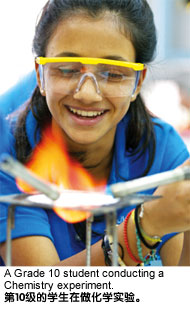 In order to nurture such students, teachers play a crucial role, and when UWCSEA recruits it looks for teachers who are trained in the IB, who are child-centred, who are aware of the cultural differences that students bring and who are themselves from diverse backgrounds. In order to nurture such students, teachers play a crucial role, and when UWCSEA recruits it looks for teachers who are trained in the IB, who are child-centred, who are aware of the cultural differences that students bring and who are themselves from diverse backgrounds.
But besides their eligibility, Mr Cairns emphasised the importance of teachers working in collaboration with students, as opposed to just teaching to them. “Something else that is very important for us is that their job doesn’t end in the classroom. We’re looking for someone who’s willing to go on expeditions and to take part in sports, among other things. One of the very first questions we ask is, ‘What else do you bring?’
“That is important because we’re looking for people who are role models for the students. We want students to be interested in the world; we want them to be committed to peace and a sustainable future. So we have to have teachers who don’t just say it, but demonstrate that they too want these things.”
Mr Cairns, who joined UWCSEA in August 2011, is very impressed by this aspect of the College. “We have really excellent staff here. Being new, I see the quality of the teachers in terms of their student interactions; and there are clearly a large number of extremely committed and intelligent people here. I think that this is an important part of what makes the school special.”
Gelling everything together, he says, is the close interpersonal relationships that can be found within UWCSEA. “Sometimes the connection and the closeness in a big organisation can be lost. But the College seems to have maintained the connection, and there is a humanity about the place which is important. If it’s all about human relationships and our obligation towards other people, if we’re saying that we want young people to go out to make a difference in the world, then how we relate to them has to be in line with that.”
|